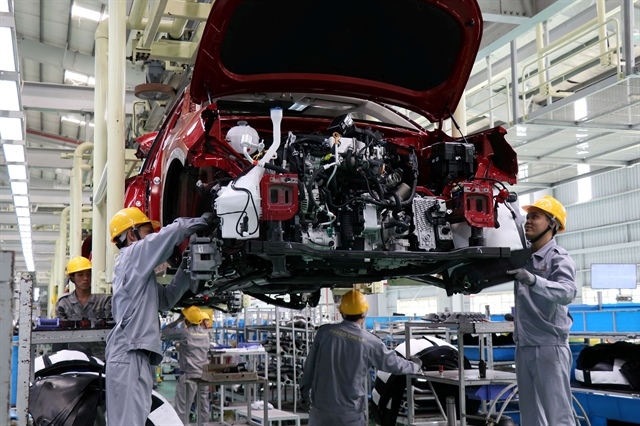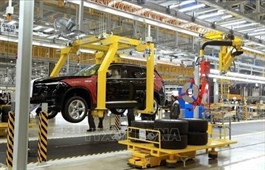Politburo issues resolution on strengthening role of private sector in domestic economy
Politburo issues resolution on strengthening role of private sector in domestic economy
The Politburo has issued strong guidance to ensure investors will be able to invest safely in land, capital and into a skilled workforce, in order to cement the development of the private economy.

A car assembly line in Thaco, a large private enterprise in Việt Nam. The private sector will be considered as the most important driving force behind the national economy. — VNA/VNS Photo |
According to Resolution No 68-NQ/TW, issued on Sunday (May 4), the private sector is considered as the most important driving force behind the national economy, so there is an urgent need for comprehensive reform to improve the institutional and policy framework that governs private enterprises.
This includes enhancing protections for ownership rights, property rights and the freedom to conduct business, while ensuring fair competition and the enforceability of contracts.
The resolution calls to foster a more favourable environment for private sector in approaching to critical resources such as land, capital and a skilled workforce.
In addition, it promotes innovation and the adoption of science, technology and digital solutions, as well as a shift toward sustainable and green business practices.
It is necessary to create stronger links between private enterprises, State-owned companies and foreign-invested firms.
The development of large and medium-sized private enterprises capable of competing on a regional and global scale is encouraged.
At the same time, there is a strong focus on providing effective support for small and micro-enterprises, as well as household businesses.
Resolution 68 also highlights the importance of nurturing a culture of business ethics, social responsibility, and entrepreneurship. Entrepreneurs are encouraged to participate more actively in national governance.
According to this resolution, in the past 40 years of economic renovation, Việt Nam’s private economy hasmade remarkable progress, in both scale and quality.
At present, the sector comprises approximately 940,000 enterprises and over five million business households. These entities collectively contribute around 50 per cent of the country's GDP, more than 30 per cent of total State budget revenues and provide employment for roughly 82 per cent of the workforce.
Private businesses have become crucial drivers of job creation, innovation, productivity gains and national competitiveness. Many have grown significantly, established strong domestic brands, and expanded into regional and international markets.
However, the sector still faces significant challenges. Most private enterprises remain small or medium-sized, with limited financial and managerial capabilities. Technological adoption, innovation, and productivity levels remain low, and many businesses lack strategic vision and integration with state or foreign-invested enterprises.
These limitations are attributed to several factors, such as outdated perceptions of the private sector’s role in the economy, bureaucratic and legal barriers and an underdeveloped infrastructure.
Additionally, access to capital, land, technology, and high-quality talent remains constrained and existing preferential policies are often difficult to access or ineffective.
Resolution 68 is expected to solve those challenges during developing the private sector and promote its role in the domestic economic development.
Under this resolution, by 2030, the private sector will be the leading engine of economic growth. It sets ambitious targets to have two million private enterprises in operation and at least 20 large private firms that integrate into global value chains.
This sector would have annual private sector growth of 10-12 per cent, surpassing the national average and a contribution of 55-58 per cent to GDP and 35-40 per cent to the State budget.
Việt Nam's technological and innovation capacity ranks among the top three in ASEAN and top five in Asia.
Looking ahead to 2045, the vision is for Việt Nam’s private economy to be robust, dynamic and globally competitive. The goals are to have at least three million enterprises contributing over 60 per cent to national GDP, with a strong presence in global production and supply chains.
- 08:00 06/05/2025



























